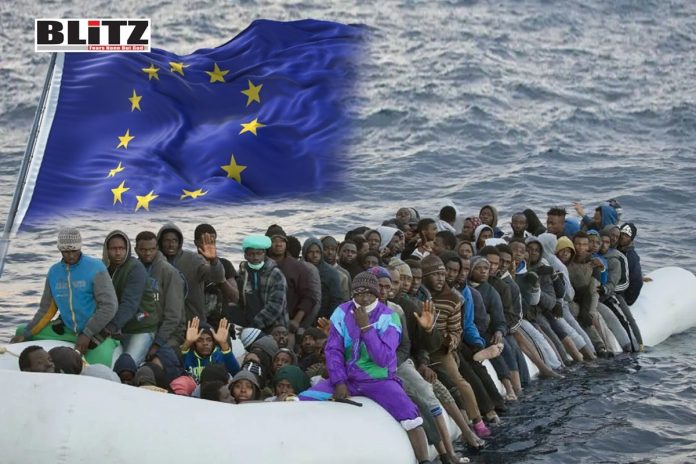Throughout history, Europe has navigated a nuanced balance between fortifying its borders and maintaining democratic principles and human rights, especially amidst the surge of migrants, notably from areas such as the Maghreb. This juxtaposition underscores a paradox within European policy. As the continent faces the challenges posed by migration, it confronts the complex task of safeguarding its territorial integrity while honoring its commitments to inclusivity and respect for human dignity.
The Maghreb holds strategic importance for Europe due to its proximity and role as a transit zone for migrants heading towards the continent. However, Europe’s reliance on agreements with authoritarian regimes in the region to stem migrant flows poses a significant ethical dilemma. While these agreements may serve short-term security interests, they risk entrenching authoritarian rule and undermining the very democratic principles Europe purports to champion.
This narrative highlights the intricate balance between Europe’s security imperatives and its dedication to advancing democratic values. The EU’s interactions in the Maghreb region epitomize this delicate equilibrium, as it maneuvers to both protect its borders and uphold human rights standards. This dynamic underscores the complexities inherent in European policymaking concerning migration and democracy.
An in-depth analysis of Brussels’ tactics in North Africa unveils a recurring trend of conceding to authoritarian regimes to enhance their ability to regulate migration movements. This strategy effectively transforms these regimes into gatekeepers for “Fortress Europe,” potentially jeopardizing the EU’s ethical standing and perpetuating instability within the region. The reliance on such partnerships raises concerns about the moral implications of prioritizing migration management over fundamental human rights and democratic principles, exacerbating the existing fragility in North Africa.
Although the short-term outcomes of such policies may appear advantageous in curtailing migrant inflows, their enduring repercussions raise alarms. The EU’s backing of authoritarian regimes not only erodes its core principles but also amplifies human rights violations in both origin and transit nations. This approach jeopardizes the integrity of the EU’s foundational values and perpetuates a cycle of oppression and injustice, ultimately undermining efforts for sustainable solutions to migration challenges.
An illustration of this is the EU’s aid to the Libyan Coast Guard, which has faced criticism for facilitating the interception of migrants at sea and exposing them to deplorable conditions in detention centers. While intended to control migration, this aid inadvertently fosters a system of exploitation and breaches of basic human rights. Such assistance underscores the ethical complexities arising from Europe’s efforts to manage migration flows in collaboration with authoritarian regimes.
Furthermore, through its provision of financial and technical support to authoritarian regimes, the EU inadvertently amplifies their authority. This reinforcement, paired with external diplomatic endorsement, solidifies authoritarian methods and suppresses democratic endeavors.
A significant ramification of this approach is the disregard for tackling the underlying reasons behind migration. Instead of prioritizing investments in economic growth and stability, the EU’s emphasis on border fortification detracts from endeavors that could mitigate incentives for irregular migration. Consequently, essential efforts to address root causes are sidelined, perpetuating a cycle where migration challenges persist unabated while fundamental issues remain unaddressed.
Moreover, the EU’s narrow focus on migration management transforms migration into a bargaining tool for countries of origin. Governments could leverage the prospect of relaxed border controls to negotiate advantageous agreements or concessions from Brussels, exacerbating existing governance shortcomings and instability. This instrumentalization of migration perpetuates a cycle where political manipulation of migration issues undermines efforts to address the root causes of instability and governance deficits.
Moreover, the absence of robust enforcement mechanisms to guarantee aid adherence to its intended purposes constitutes a significant lapse. Without rigorous oversight and accountability protocols, aid provision is susceptible to fostering corruption and bolstering authoritarian regimes, undermining the very principles the aid intends to promote.
Europe’s present migration strategy not only compromises its fundamental values but also threatens to escalate instability within the region. To effectively tackle this pressing issue, European policymakers must undertake a comprehensive reassessment of migration policies, with a focus on upholding democratic principles and addressing the underlying causes of migration.
Central to this approach is the prioritization of long-term solutions that foster cooperation and development, both within the European Union and in collaboration with the international community. By embracing sustainable and ethical migration practices, Europe can strike a balance between its security imperatives and its democratic commitments, thereby fostering stability and prosperity for all stakeholders involved.




